Advanced Mountain Rescue
Overview
Complex team and self-rescue operations are made even more complex by a remote environment; but in mountain rescue, a remote environment is just the beginning. The complexities of rescue activity are compounded by the additional difficulty of dealing with glaciers, snow and ice. And while all steep and high-angle rescue problems have environmental factors, mountain rescue tends to amplify the issues. In other words, everything is harder to do.
The Advanced Mountain Rescue course was designed for individuals who already have a high level of rescue training, who wish to apply their rope rescue, team rescue, and self-rescue skills in a snow and ice environment. The central focus of the course is "lightening-up" front-country rescue tactics, while also developing improvisational rescue skills.
Crevasse Rescue
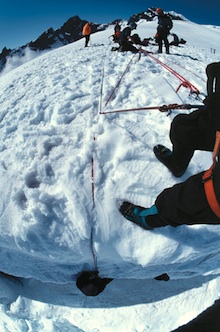
Reviewing important crevasse rescue techniques is crucial in mountain rescue scenarios.
AAI Collection
Nearly all mountaineers practice crevasse rescue at some level. The American Alpine Institute teaches this skill in a variety of different courses. However, in most of these, the skills are built to be user friendly for recreational climbers. In the Advanced Mountain Rescue course, we will look at some specific problems with high-end crevasse rescue. These will include topics such as the performance of first aid prior to hauling the victim out of the crevasse and passing knots in the rescue system.
Technical Rope Rescue Comprehensive Certificate
Those who complete the Advanced Mountain Rescue course will receive a Technical Rope Rescue Comprehensive certificate of completion.
Technical Rope Rescue Comprehensive
Many of those who participate in the Advanced Mountain Rescue Course have a high level of training from their organization, from another organization or from AAI. However, those who participate in this course should be aware that Advanced Mountain Rescue course is also the fourth part of a 14-day four-part rescue comprehensive series. The Level I Operations Course lays the groundwork. The Level II Technician Course builds on that groundwork. The Self-Rescue for Climbers program adds personal and companion rescue to a rescuer's skillset. And then finally, the Advanced Mountain Rescue program takes the skills learned in the Operations, Technician, and Self-Rescue courses and builds on them with high-end mountain rescue skills.
A rescuer may choose to take one, two, three or all four parts together. Or the rescuer may choose to break up the courses into bite-sized chunks.
To learn more about the Technical Rope Rescue Comprehensive program, click here.
Advanced Mountain Rescue
Details
Prerequisites
Climbers who are interested in taking the Advanced Mountain Rescue seminar should have completed a Rope Rescue Technician course, a Self-Rescue/Rock Rescue course, and should have previous mountaineering and crevasse rescue experience.
Inclusions and Exclusions
Included with the tuition are instructors, group equipment (both rescue and climbing), permit fees, and transportation to and from field program locations. A live Zoom gear consult is also included.
Excluded are front-country lodging, personal climbing equipment, transportation to AAI, food, trip insurance, camping equipment, and guide gratuities.
Organizations and Credentials
There are several organizations that oversee rescue standards in the United States. They all have different missions, but many of the core rope rescue components are the same.
Following is a list of the organizations that develop rope rescue standards. AAI's rescue programs align with these organizations and the standards they set fourth.
Mountain Rescue Association (MRA)
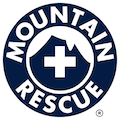
The MRA oversees a patchwork of volunteer and professional rescue teams in the United States and Canada. They develop standards and accredit local mountain rescue units in three disciplines: high-angle rescue, search, and snow.
National Fire Protection Association (NFPA)
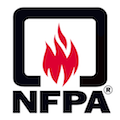
The NFPA is an organization devoted to "eliminating death, injury, property and economic loss due to fire, electrical and related hazards." To do this, the organization develops codes and standards for individuals operating within the fire service. These standards include operating practices for technical rescue teams.
American Mountain Guides Association (AMGA)
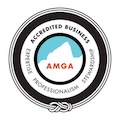
The AMGA oversees technical mountain guides in the United States. The organization credentials instructors and guides, while also accrediting guide services. The AMGA recognizes three disciplines with several levels of certification. The disciplines are Rock, Alpine and Ski. Each discipline has rescue components on which instructors and guides are tested.
International Technical Rescue Association (ITRA)
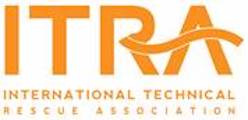
The ITRA is an organization that provides global recognition of technical rescue practitioners and instructors, across a wide range of rescue disciplines, including swiftwater, rope, boat, confined space and animal rescue.
Why should I complete my rescue training with the American Alpine Institute?
There are three primary reasons why you should consider AAI:
1) Experience: All AAI Instructors are also mountain guides with extensive and diverse experience in high-angle terrain. They work with ropes every day and constantly solve new technical problems. Additionally, all AAI rope rescue instructors have technical training from the American Mountain Guides Association.
2) Continuing Education: Members of the AAI Technical Rope Rescue Instructor Team get regular updates and continuing education in technical rescue. These updates come from a wide array of conferences and meetings. One or two Instructor Team members attend a given meeting and then bring what they learn back to the rest of the instructors, as well as to AAI students. The meetings and conferences attended on a regular basis include, but are not limited to, the International Technical Rescue Symposium, the International Commission on Alpine Rescue, the Mountain Rescue Association Annual Meeting, the Wilderness Risk Management Conference, and the American Mountain Guides Association.
3) Commitment to International Standards: The American Alpine Institute is a founding member of the International Technical Rescue Association (ITRA). AAI's programs are overseen by ITRA Level III Instructors, the highest level instructor recognized.